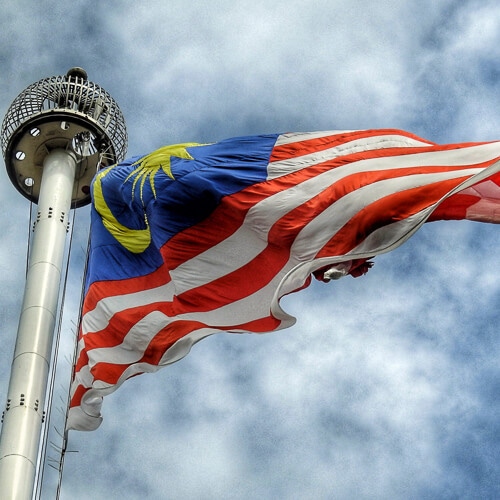
Malaysia's single-network 5G experiment is starting to take shape – but an early sign of the potential negative impact on operators has appeared.
In an important milestone, the industry-funded project has just raised 800 million ringgit (US$193 million) from local banks to finance the first phase.
Digital Nasional Berhad (DNB), the dedicated government entity created to build and manage the national wholesale network, is seeking a further 2.3 billion ringgit ($554 million) in syndicated financing for future phases, New Straits Times reports.
Figure 1:  Flagging risk: Existing spectrum will not be used for 5G – causing operators concern.
Flagging risk: Existing spectrum will not be used for 5G – causing operators concern.
(Source: mkjr_ on Unsplash)
DNB has tapped Ericsson as the sole supplier in a ten-year 11 billion ringgit deal ($2.7 billion) that covers cloud-native 5G core and RAN, OSS/BSS and network management.
The aim is to launch initial services in Kuala Lumpur, Putrajaya and Cyberjaya by year-end, with a target of covering 80% of the population by 2024.
Not so fast
But Maxis Communications, one of the biggest operators, has warned that the limits imposed on 4G spectrum means it may need to re-evaluate its spectrum holdings and could affect future earnings.
Regulator Malaysian Communications and Multimedia Commission (MCMC), has ruled that legacy bands – 900MHz, 1800MHz, 2100MHz and 2600MHz – will be confined to 4G only.
This change limited the company's ability to repurpose its spectrum and would have "consequential impact on the group's estimated useful life of the spectrum rights," Maxis said in its Q3 results issued Friday.
It also bears out a warning from a GSMA-commissioned study that the wholesale scheme could mean inefficient management of spectrum.
"To the extent that MNOs are unable to re-farm their current spectrum holdings to provide 5G services in the future, this could lead to inefficient use of their spectrum leading to stranded assets," the report, issued in September, said.
Interested in Asia? Check out our dedicated content channel here on Light Reading.
It said this was one of a number of potential risks posed by the wholesale project. Others include lower network capex, a lack of clarity over spectrum pricing and wholesale price regulation, and the DNB's undefined role and priorities.
The report says single-wholesale networks have a poor track record, noting that Altan Redes, Mexico's national 4G wholesaler, has just filed for bankruptcy protection.
Malaysia has not experienced any kind of market failure that would justify government intervention, the study said.
"A monopolist with exclusive rights to offer 5G wholesale services (and with no clarity on the framework for how its prices will be regulated) will be, in our view, to the detriment of consumers and enterprises and the broader ambitions of Malaysia to digitize the economy."
Related posts:
— Robert Clark, contributing editor, special to Light Reading
Read more about:
AsiaAbout the Author(s)
You May Also Like




_International_Software_Products.jpeg?width=300&auto=webp&quality=80&disable=upscale)







